The Impact of Ethics and CSR on Business: A Detailed Report
VerifiedAdded on 2023/01/19
|6
|1333
|43
Report
AI Summary
This report delves into the critical role of ethics and Corporate Social Responsibility (CSR) in the contemporary business landscape. It begins by explaining the dynamic and ever-changing nature of the business environment, highlighting the impact of factors like technology and customer preferences. The report then explores the importance of both individuals and organizations managing responsibly and behaving ethically, emphasizing the need for companies to adapt to ethical principles and CSR practices. Task 1 addresses how organizations can modify their internal environment to comply with CSR, referencing examples like The Ledbury. Task 2 identifies the reasons behind the necessity for responsible and ethical management, providing examples such as Intercontinental Hotel Groups, Harley Davidson, and Barclays Plc to illustrate the benefits of ethical behavior, including competitive advantage, enhanced customer integrity, brand image, and social welfare. The report also touches upon the impacts of CSR on leadership, such as transparency, ethical promotion, and training methods. In conclusion, the report stresses the significance of ethical compliance and shaping both the micro and macro environments to sustain business success. The report is contributed by a student to be published on the website Desklib.

ETHICS AND CSR IN
BUSINESS
BUSINESS
Paraphrase This Document
Need a fresh take? Get an instant paraphrase of this document with our AI Paraphraser
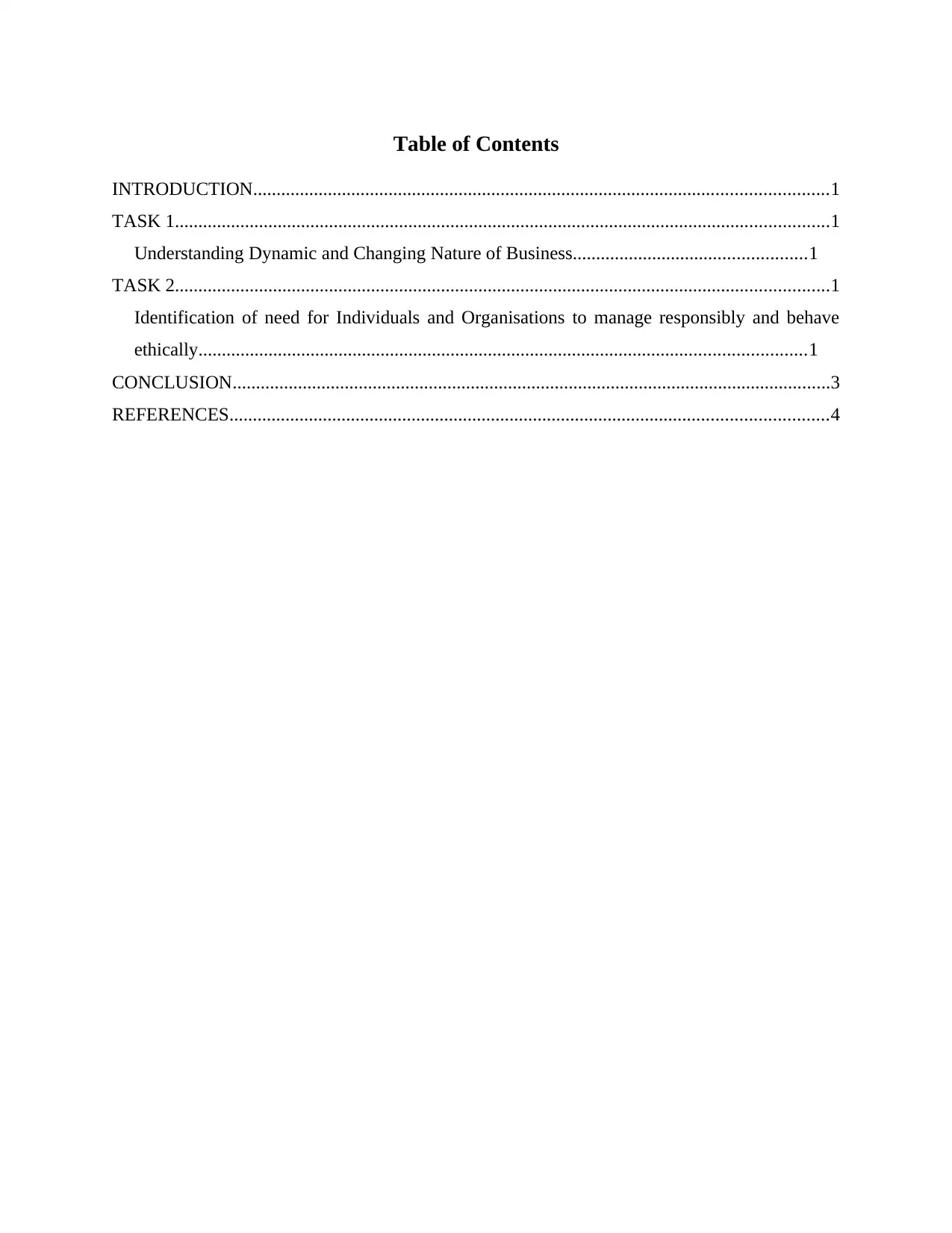
Table of Contents
INTRODUCTION...........................................................................................................................1
TASK 1............................................................................................................................................1
Understanding Dynamic and Changing Nature of Business..................................................1
TASK 2............................................................................................................................................1
Identification of need for Individuals and Organisations to manage responsibly and behave
ethically..................................................................................................................................1
CONCLUSION................................................................................................................................3
REFERENCES................................................................................................................................4
INTRODUCTION...........................................................................................................................1
TASK 1............................................................................................................................................1
Understanding Dynamic and Changing Nature of Business..................................................1
TASK 2............................................................................................................................................1
Identification of need for Individuals and Organisations to manage responsibly and behave
ethically..................................................................................................................................1
CONCLUSION................................................................................................................................3
REFERENCES................................................................................................................................4
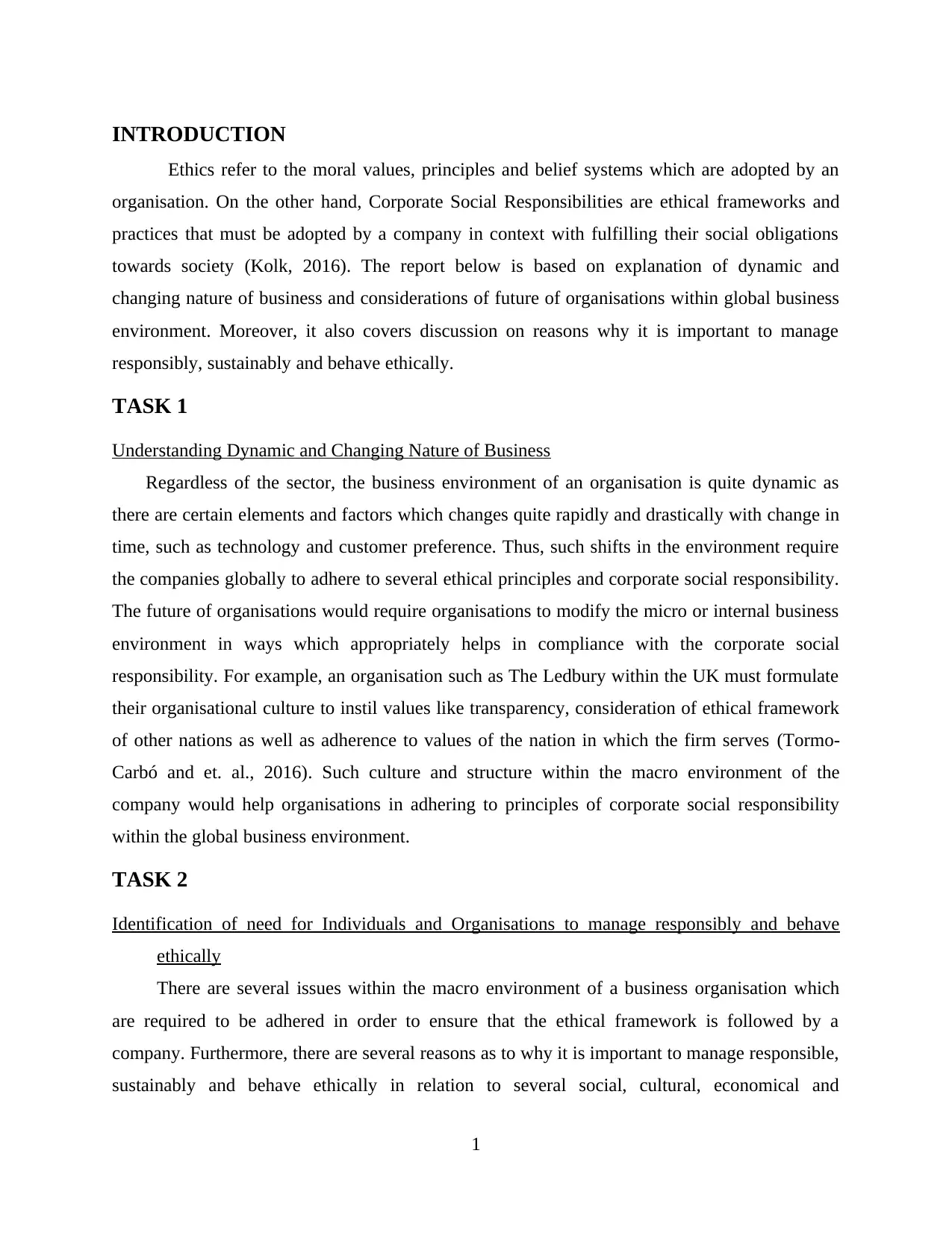
INTRODUCTION
Ethics refer to the moral values, principles and belief systems which are adopted by an
organisation. On the other hand, Corporate Social Responsibilities are ethical frameworks and
practices that must be adopted by a company in context with fulfilling their social obligations
towards society (Kolk, 2016). The report below is based on explanation of dynamic and
changing nature of business and considerations of future of organisations within global business
environment. Moreover, it also covers discussion on reasons why it is important to manage
responsibly, sustainably and behave ethically.
TASK 1
Understanding Dynamic and Changing Nature of Business
Regardless of the sector, the business environment of an organisation is quite dynamic as
there are certain elements and factors which changes quite rapidly and drastically with change in
time, such as technology and customer preference. Thus, such shifts in the environment require
the companies globally to adhere to several ethical principles and corporate social responsibility.
The future of organisations would require organisations to modify the micro or internal business
environment in ways which appropriately helps in compliance with the corporate social
responsibility. For example, an organisation such as The Ledbury within the UK must formulate
their organisational culture to instil values like transparency, consideration of ethical framework
of other nations as well as adherence to values of the nation in which the firm serves (Tormo-
Carbó and et. al., 2016). Such culture and structure within the macro environment of the
company would help organisations in adhering to principles of corporate social responsibility
within the global business environment.
TASK 2
Identification of need for Individuals and Organisations to manage responsibly and behave
ethically
There are several issues within the macro environment of a business organisation which
are required to be adhered in order to ensure that the ethical framework is followed by a
company. Furthermore, there are several reasons as to why it is important to manage responsible,
sustainably and behave ethically in relation to several social, cultural, economical and
1
Ethics refer to the moral values, principles and belief systems which are adopted by an
organisation. On the other hand, Corporate Social Responsibilities are ethical frameworks and
practices that must be adopted by a company in context with fulfilling their social obligations
towards society (Kolk, 2016). The report below is based on explanation of dynamic and
changing nature of business and considerations of future of organisations within global business
environment. Moreover, it also covers discussion on reasons why it is important to manage
responsibly, sustainably and behave ethically.
TASK 1
Understanding Dynamic and Changing Nature of Business
Regardless of the sector, the business environment of an organisation is quite dynamic as
there are certain elements and factors which changes quite rapidly and drastically with change in
time, such as technology and customer preference. Thus, such shifts in the environment require
the companies globally to adhere to several ethical principles and corporate social responsibility.
The future of organisations would require organisations to modify the micro or internal business
environment in ways which appropriately helps in compliance with the corporate social
responsibility. For example, an organisation such as The Ledbury within the UK must formulate
their organisational culture to instil values like transparency, consideration of ethical framework
of other nations as well as adherence to values of the nation in which the firm serves (Tormo-
Carbó and et. al., 2016). Such culture and structure within the macro environment of the
company would help organisations in adhering to principles of corporate social responsibility
within the global business environment.
TASK 2
Identification of need for Individuals and Organisations to manage responsibly and behave
ethically
There are several issues within the macro environment of a business organisation which
are required to be adhered in order to ensure that the ethical framework is followed by a
company. Furthermore, there are several reasons as to why it is important to manage responsible,
sustainably and behave ethically in relation to several social, cultural, economical and
1
⊘ This is a preview!⊘
Do you want full access?
Subscribe today to unlock all pages.

Trusted by 1+ million students worldwide
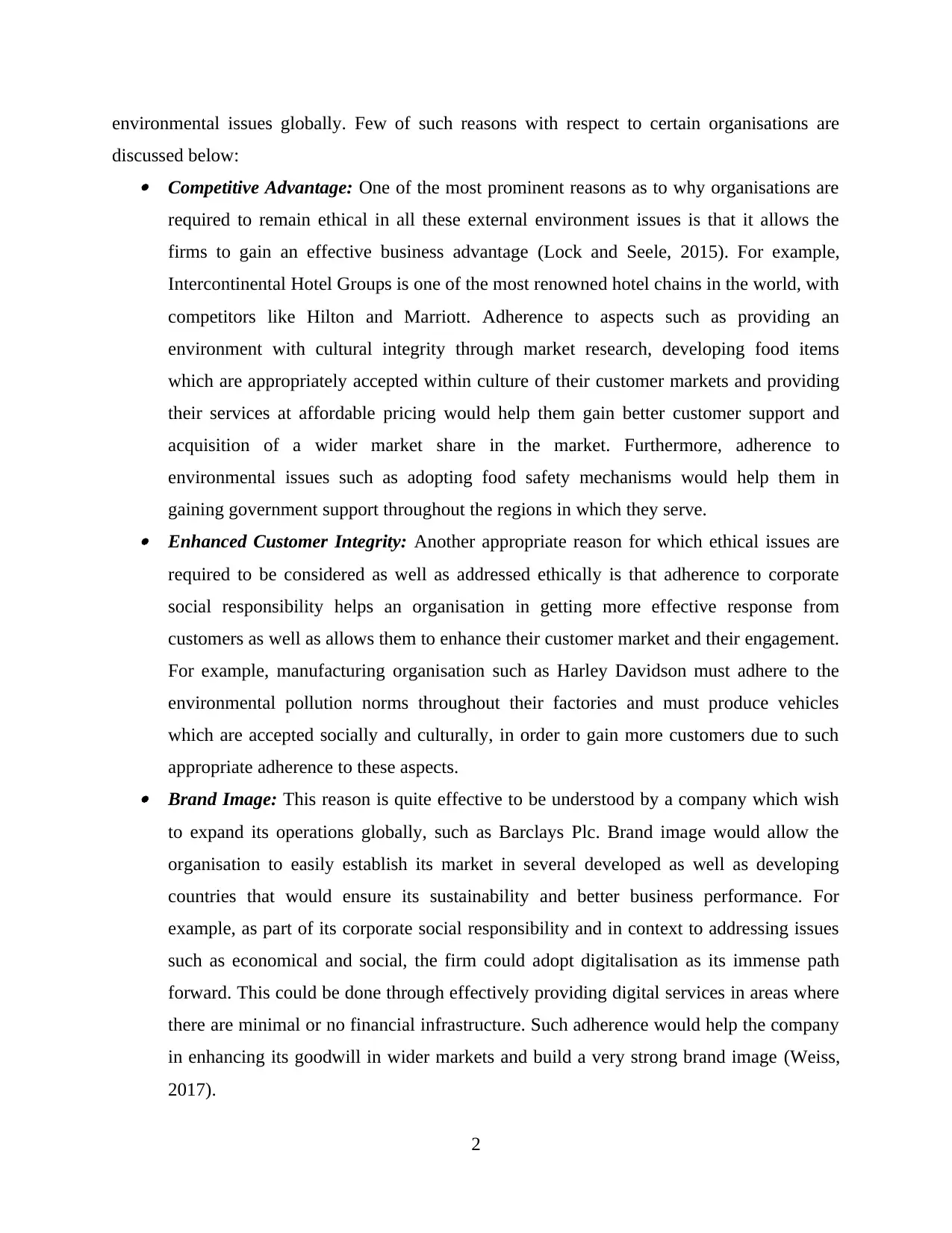
environmental issues globally. Few of such reasons with respect to certain organisations are
discussed below: Competitive Advantage: One of the most prominent reasons as to why organisations are
required to remain ethical in all these external environment issues is that it allows the
firms to gain an effective business advantage (Lock and Seele, 2015). For example,
Intercontinental Hotel Groups is one of the most renowned hotel chains in the world, with
competitors like Hilton and Marriott. Adherence to aspects such as providing an
environment with cultural integrity through market research, developing food items
which are appropriately accepted within culture of their customer markets and providing
their services at affordable pricing would help them gain better customer support and
acquisition of a wider market share in the market. Furthermore, adherence to
environmental issues such as adopting food safety mechanisms would help them in
gaining government support throughout the regions in which they serve. Enhanced Customer Integrity: Another appropriate reason for which ethical issues are
required to be considered as well as addressed ethically is that adherence to corporate
social responsibility helps an organisation in getting more effective response from
customers as well as allows them to enhance their customer market and their engagement.
For example, manufacturing organisation such as Harley Davidson must adhere to the
environmental pollution norms throughout their factories and must produce vehicles
which are accepted socially and culturally, in order to gain more customers due to such
appropriate adherence to these aspects. Brand Image: This reason is quite effective to be understood by a company which wish
to expand its operations globally, such as Barclays Plc. Brand image would allow the
organisation to easily establish its market in several developed as well as developing
countries that would ensure its sustainability and better business performance. For
example, as part of its corporate social responsibility and in context to addressing issues
such as economical and social, the firm could adopt digitalisation as its immense path
forward. This could be done through effectively providing digital services in areas where
there are minimal or no financial infrastructure. Such adherence would help the company
in enhancing its goodwill in wider markets and build a very strong brand image (Weiss,
2017).
2
discussed below: Competitive Advantage: One of the most prominent reasons as to why organisations are
required to remain ethical in all these external environment issues is that it allows the
firms to gain an effective business advantage (Lock and Seele, 2015). For example,
Intercontinental Hotel Groups is one of the most renowned hotel chains in the world, with
competitors like Hilton and Marriott. Adherence to aspects such as providing an
environment with cultural integrity through market research, developing food items
which are appropriately accepted within culture of their customer markets and providing
their services at affordable pricing would help them gain better customer support and
acquisition of a wider market share in the market. Furthermore, adherence to
environmental issues such as adopting food safety mechanisms would help them in
gaining government support throughout the regions in which they serve. Enhanced Customer Integrity: Another appropriate reason for which ethical issues are
required to be considered as well as addressed ethically is that adherence to corporate
social responsibility helps an organisation in getting more effective response from
customers as well as allows them to enhance their customer market and their engagement.
For example, manufacturing organisation such as Harley Davidson must adhere to the
environmental pollution norms throughout their factories and must produce vehicles
which are accepted socially and culturally, in order to gain more customers due to such
appropriate adherence to these aspects. Brand Image: This reason is quite effective to be understood by a company which wish
to expand its operations globally, such as Barclays Plc. Brand image would allow the
organisation to easily establish its market in several developed as well as developing
countries that would ensure its sustainability and better business performance. For
example, as part of its corporate social responsibility and in context to addressing issues
such as economical and social, the firm could adopt digitalisation as its immense path
forward. This could be done through effectively providing digital services in areas where
there are minimal or no financial infrastructure. Such adherence would help the company
in enhancing its goodwill in wider markets and build a very strong brand image (Weiss,
2017).
2
Paraphrase This Document
Need a fresh take? Get an instant paraphrase of this document with our AI Paraphraser
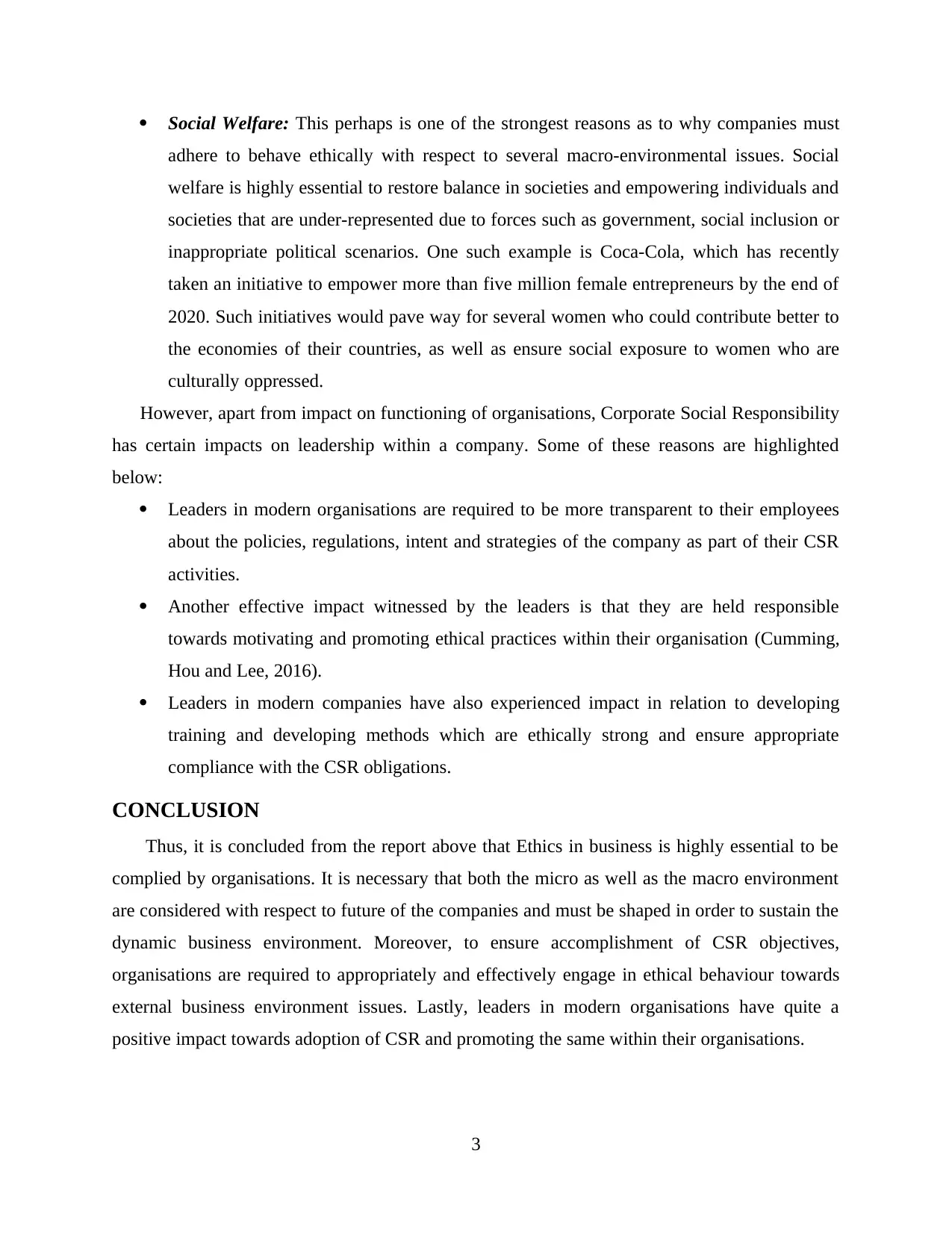
Social Welfare: This perhaps is one of the strongest reasons as to why companies must
adhere to behave ethically with respect to several macro-environmental issues. Social
welfare is highly essential to restore balance in societies and empowering individuals and
societies that are under-represented due to forces such as government, social inclusion or
inappropriate political scenarios. One such example is Coca-Cola, which has recently
taken an initiative to empower more than five million female entrepreneurs by the end of
2020. Such initiatives would pave way for several women who could contribute better to
the economies of their countries, as well as ensure social exposure to women who are
culturally oppressed.
However, apart from impact on functioning of organisations, Corporate Social Responsibility
has certain impacts on leadership within a company. Some of these reasons are highlighted
below:
Leaders in modern organisations are required to be more transparent to their employees
about the policies, regulations, intent and strategies of the company as part of their CSR
activities.
Another effective impact witnessed by the leaders is that they are held responsible
towards motivating and promoting ethical practices within their organisation (Cumming,
Hou and Lee, 2016).
Leaders in modern companies have also experienced impact in relation to developing
training and developing methods which are ethically strong and ensure appropriate
compliance with the CSR obligations.
CONCLUSION
Thus, it is concluded from the report above that Ethics in business is highly essential to be
complied by organisations. It is necessary that both the micro as well as the macro environment
are considered with respect to future of the companies and must be shaped in order to sustain the
dynamic business environment. Moreover, to ensure accomplishment of CSR objectives,
organisations are required to appropriately and effectively engage in ethical behaviour towards
external business environment issues. Lastly, leaders in modern organisations have quite a
positive impact towards adoption of CSR and promoting the same within their organisations.
3
adhere to behave ethically with respect to several macro-environmental issues. Social
welfare is highly essential to restore balance in societies and empowering individuals and
societies that are under-represented due to forces such as government, social inclusion or
inappropriate political scenarios. One such example is Coca-Cola, which has recently
taken an initiative to empower more than five million female entrepreneurs by the end of
2020. Such initiatives would pave way for several women who could contribute better to
the economies of their countries, as well as ensure social exposure to women who are
culturally oppressed.
However, apart from impact on functioning of organisations, Corporate Social Responsibility
has certain impacts on leadership within a company. Some of these reasons are highlighted
below:
Leaders in modern organisations are required to be more transparent to their employees
about the policies, regulations, intent and strategies of the company as part of their CSR
activities.
Another effective impact witnessed by the leaders is that they are held responsible
towards motivating and promoting ethical practices within their organisation (Cumming,
Hou and Lee, 2016).
Leaders in modern companies have also experienced impact in relation to developing
training and developing methods which are ethically strong and ensure appropriate
compliance with the CSR obligations.
CONCLUSION
Thus, it is concluded from the report above that Ethics in business is highly essential to be
complied by organisations. It is necessary that both the micro as well as the macro environment
are considered with respect to future of the companies and must be shaped in order to sustain the
dynamic business environment. Moreover, to ensure accomplishment of CSR objectives,
organisations are required to appropriately and effectively engage in ethical behaviour towards
external business environment issues. Lastly, leaders in modern organisations have quite a
positive impact towards adoption of CSR and promoting the same within their organisations.
3
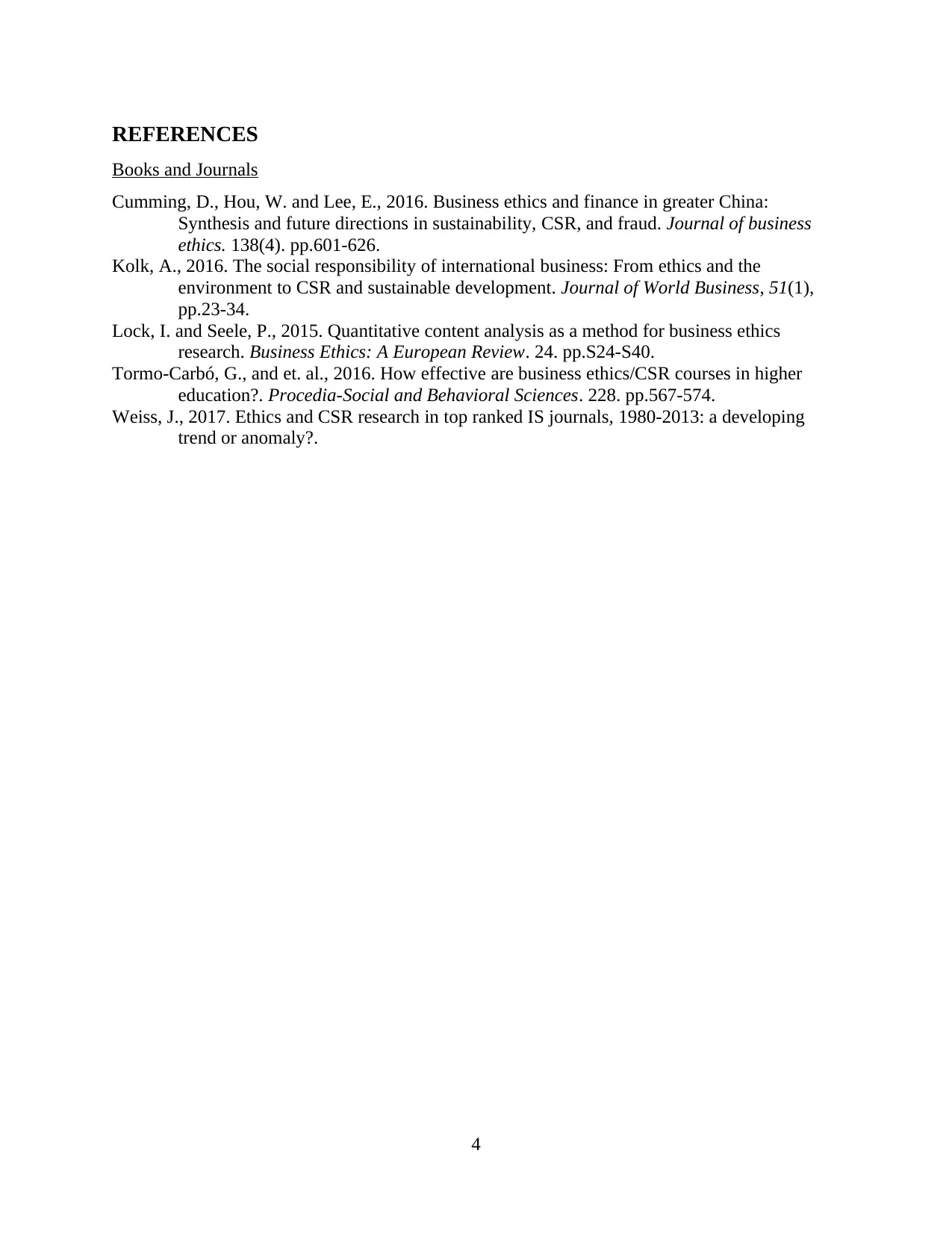
REFERENCES
Books and Journals
Cumming, D., Hou, W. and Lee, E., 2016. Business ethics and finance in greater China:
Synthesis and future directions in sustainability, CSR, and fraud. Journal of business
ethics. 138(4). pp.601-626.
Kolk, A., 2016. The social responsibility of international business: From ethics and the
environment to CSR and sustainable development. Journal of World Business, 51(1),
pp.23-34.
Lock, I. and Seele, P., 2015. Quantitative content analysis as a method for business ethics
research. Business Ethics: A European Review. 24. pp.S24-S40.
Tormo-Carbó, G., and et. al., 2016. How effective are business ethics/CSR courses in higher
education?. Procedia-Social and Behavioral Sciences. 228. pp.567-574.
Weiss, J., 2017. Ethics and CSR research in top ranked IS journals, 1980-2013: a developing
trend or anomaly?.
4
Books and Journals
Cumming, D., Hou, W. and Lee, E., 2016. Business ethics and finance in greater China:
Synthesis and future directions in sustainability, CSR, and fraud. Journal of business
ethics. 138(4). pp.601-626.
Kolk, A., 2016. The social responsibility of international business: From ethics and the
environment to CSR and sustainable development. Journal of World Business, 51(1),
pp.23-34.
Lock, I. and Seele, P., 2015. Quantitative content analysis as a method for business ethics
research. Business Ethics: A European Review. 24. pp.S24-S40.
Tormo-Carbó, G., and et. al., 2016. How effective are business ethics/CSR courses in higher
education?. Procedia-Social and Behavioral Sciences. 228. pp.567-574.
Weiss, J., 2017. Ethics and CSR research in top ranked IS journals, 1980-2013: a developing
trend or anomaly?.
4
⊘ This is a preview!⊘
Do you want full access?
Subscribe today to unlock all pages.

Trusted by 1+ million students worldwide
1 out of 6
Related Documents
Your All-in-One AI-Powered Toolkit for Academic Success.
+13062052269
info@desklib.com
Available 24*7 on WhatsApp / Email
![[object Object]](/_next/static/media/star-bottom.7253800d.svg)
Unlock your academic potential
Copyright © 2020–2026 A2Z Services. All Rights Reserved. Developed and managed by ZUCOL.




